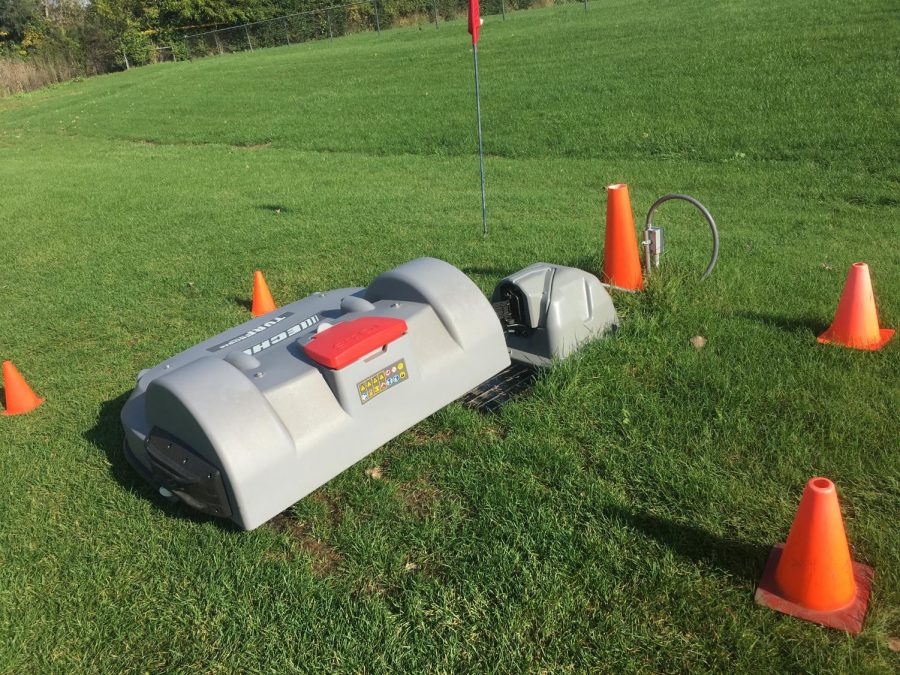Local business donates 20,000 dollars and lawnmower to LZ
October 14, 2018
Its four o’clock in the morning, the chilly breeze of night is just starting to warm with the rise of the sun, most humans and machines are asleep at this hour. But, one hardworking lawnmower is out, snipping the grass of Lake Zurich High Schools backfields. It’s mission? To mow every piece of grass on the field, and that is just what it will do.
The ECHO lawnmower, which was donated to the LZHS robotics club along with 20,000 dollars by the company Echo, who develops and manufactures professional-grade, handheld landscaping equipment, according to echo-usa.com.
This donation was because of the close location of the high school and ECHO’s wish to serve its community, according to Cameron Circo, President of the robotics club.
“[They are testing the lawnmower at LZ because] it is a close location in which they can test their product as well as give back to their community,” Circo said. “[The lawnmower] is currently operating in the back baseball/football field, we are adding in testing sensors like ultrasonics. Echo gave robotics a $20,000 grant and is testing their robot mower in the back field.”
Ultrasonic sensors, which have mechanics like echolocation, according to Jason Saab, Co-software and electrical lead for the robotics club, are used by the lawnmower help it maneuver around the field and make sure it doesn’t bump into anything, according to Saab. There are also other mechanics that assist the mower to cut the grass, like a magnetic line that is essentially a border, according to Saab.
“There are a few things it uses, like ultrasonic, it’s essentially echolocation but the proper term is ultrasonic. There’s a sensor that it uses. It sends out sound waves and then it bounces off those objects and the sound waves bounce back to the sensor and the sensor determines how far away [the lawnmower] is from the object. But that is just for making sure it doesn’t run into anything, like a human or a pole,” Saab said. “There is actually a magnetic wire that is under ground and ran around the entire field. [The wire] determines the area that the mower is supposed to mow inside of. When it reaches that wire, [the mower] will be able to tell because of the sensors inside of it that tell it when it is approaching the wire. Essentially it’s like a rumba hitting wall, [the mower] goes up to the wire and then turns in a random direction.”
Along with the lawnmower and sponsorship, Echo presented challenges in which the robotics team had to solve which tested the mowers abilities and mechanics, according to Saab. Some of the challenges have the robotics team calculating the approximate time to complete a field and testing the ultrasonic sensors, Circo said.
“The relationship between [echo and LZ robotics] is sort of like a partnership. We give them our field and they give us the money, but [the robotics club] is also talking about ways they can make it better. [Echo] is discussing with us, but also teaching us the mechanics and electronics of it. A couple challenges they gave us to wrap our heads around is: To figure out what is the probability that [the lawnmower] can get ever speck of grass, because it’s going in random directions and it’s very hard to get every blade of grass. Or how long [the mower] would take to get every single blade of grass. There was another challenge that had to do with [the mowers] ultrasonic sensors, to see, just how far the sensors would be able to spot a pole with a 2 inch diameter, 1 inch diameter, 3 inch diameter, and to see how far away it would be able to sense the poles. See the speed it would be able to sense the poles,” Saab said. “[Echo] is sorta giving us these challenges to see how it will react to these objects, these poles that we put in. To see how the robot will act around it, will it slow down faster, will it not slow down, will it not recognize it, will it take longer or shorter to recognize it, things like that.”
This opportunity has been very beneficial for the LZHS robotics team, and has helped them get a real world experience rather than just learning about engineering in the classroom, according to Circo. The sponsorship and challenges are helping stimulate the robotics team and get them ready for modern day robotics, and what will be most of the students future jobs, according to Saab.
“We’re, one, getting a good amount of money from [Echo]. They’re going to be our title sponsor, they’re sponsoring us for 20,000 dollars. That’s really going to help us with getting the materials for building our robots and for entering regionals. It’s also great for us because [this partnership] is giving us a lot of hands on real world experience with issues that are going on today in modern day robotics. It’s giving us a chance to apply our knowledges that we learned from FRC, the robotics competition that’s what FRC is. We’ve learned building and coding robots for specific games and now we get to apply that to real world issues that are going on today,” Saab said. “We get to get our foot in the door for what will hopefully be, for what a lot of [robotics members] will be doing as our jobs in the future.”

